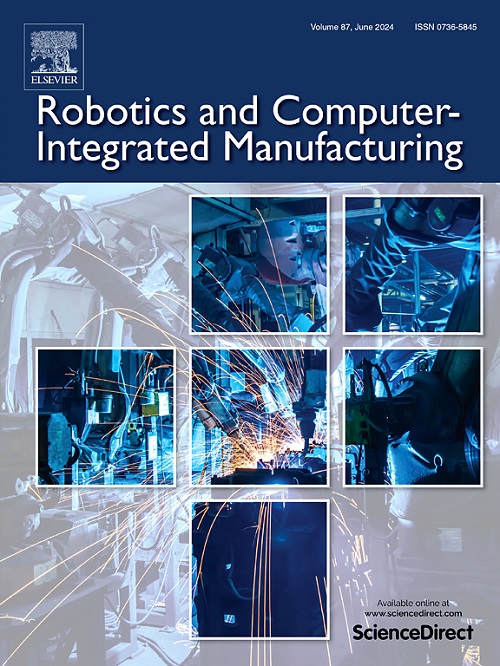A two-phase approach for benefit-driven and correlation-aware service composition allocation in cloud manufacturing
IF 11.4
1区 计算机科学
Q1 COMPUTER SCIENCE, INTERDISCIPLINARY APPLICATIONS
引用次数: 0
Abstract
Manufacturing service composition (MSC) is a fundamental component of cloud manufacturing that involves multiple stakeholders and associated services. Stakeholders, viewed as autonomous entities, prioritize both temporary gains and long-term benefits, while service interactions significantly influence the feasibility and quality of MSCs. Effective MSC allocation demands a strategic approach that harmonizes stakeholders’ interests and accounts for service correlations to achieve optimal outcomes. Although previous studies have explored stakeholders’ long- and short-term benefits and service correlations independently, a comprehensive framework that integrates these aspects, aligns diverse interests, and thoroughly examines service correlation impacts remains a significant challenge. To bridge this gap, this study proposes a two-phase approach for benefit-driven and correlation-aware MSC allocation. This approach integrates the long- and short-term benefits of platform operators, service requesters, and resource suppliers, as well as the effects of two types of service correlations, composability-focused and quality-focused, on MSCs. The initial phase constructs a bi-objective optimization model with maximizing operational benefits to filter and recommend MSCs. Composability-focused service correlations are incorporated in the model to ensure MSC feasibility. The second phase refines the optimal MSC selection by matching supply and demand, leveraging quality-focused service correlations to modify MSC quality. A hybrid algorithm, combining an improved fast nondominated sorting genetic algorithm (PANSGA-II) with an enhanced technique for order preference by similarity to the ideal solution (TOPSIS-PR), is developed to solve the two-phase problem. The case study and numerical experiments are conducted to validate the applicability and effectiveness of the proposed approach and algorithm.
云制造中利益驱动和关联感知服务组合分配的两阶段方法
制造服务组合(MSC)是云制造的基本组件,涉及多个利益相关者和相关服务。利益相关者被视为自主实体,优先考虑临时收益和长期利益,而服务互动对msc的可行性和质量有重大影响。有效的MSC分配需要一种协调利益相关者利益和服务相关性的战略方法,以实现最佳结果。虽然以前的研究已经独立地探讨了利益相关者的长期和短期利益以及服务相关性,但是一个综合这些方面、协调不同利益并彻底检查服务相关性影响的综合框架仍然是一个重大挑战。为了弥补这一差距,本研究提出了一个两阶段的方法,用于利益驱动和相关性意识的MSC分配。这种方法整合了平台运营商、服务请求者和资源供应商的长期和短期利益,以及两种类型的服务相关性(以可组合性为中心和以质量为中心)对msc的影响。在初始阶段,构建具有最大运营效益的双目标优化模型来筛选和推荐MSCs。以可组合性为中心的服务关联被合并到模型中,以确保MSC的可行性。第二阶段通过匹配供需,利用以质量为中心的服务相关性来调整MSC质量,从而优化最佳MSC选择。提出了一种将改进的快速非支配排序遗传算法(PANSGA-II)与改进的基于理想解相似性的排序偏好技术(TOPSIS-PR)相结合的混合算法来求解两阶段问题。通过实例分析和数值实验验证了所提方法和算法的适用性和有效性。
本文章由计算机程序翻译,如有差异,请以英文原文为准。
求助全文
约1分钟内获得全文
求助全文
来源期刊
CiteScore
24.10
自引率
13.50%
发文量
160
审稿时长
50 days
期刊介绍:
The journal, Robotics and Computer-Integrated Manufacturing, focuses on sharing research applications that contribute to the development of new or enhanced robotics, manufacturing technologies, and innovative manufacturing strategies that are relevant to industry. Papers that combine theory and experimental validation are preferred, while review papers on current robotics and manufacturing issues are also considered. However, papers on traditional machining processes, modeling and simulation, supply chain management, and resource optimization are generally not within the scope of the journal, as there are more appropriate journals for these topics. Similarly, papers that are overly theoretical or mathematical will be directed to other suitable journals. The journal welcomes original papers in areas such as industrial robotics, human-robot collaboration in manufacturing, cloud-based manufacturing, cyber-physical production systems, big data analytics in manufacturing, smart mechatronics, machine learning, adaptive and sustainable manufacturing, and other fields involving unique manufacturing technologies.

 求助内容:
求助内容: 应助结果提醒方式:
应助结果提醒方式:


